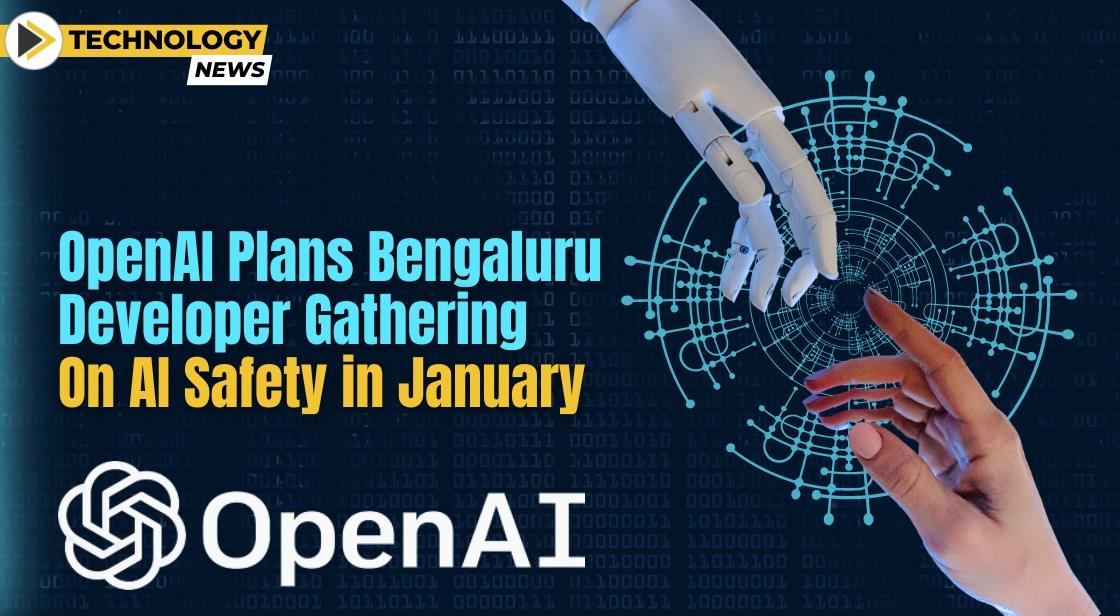OpenAI Plans Bengaluru Developer Gathering on AI Safety in January

News Synopsis
OpenAI, the creator of ChatGPT, is gearing up for a developer gathering in Bengaluru slated for January, focusing on critical AI safety concerns. Anna Makanju, Vice President of Global Affairs at OpenAI, disclosed this initiative, emphasizing the importance of engaging with India's tech community on AI safety issues.
OpenAI's Developer Gathering in Bengaluru
OpenAI, the renowned AI research lab behind ChatGPT, is set to convene a developer gathering in Bengaluru, India, this January. This event marks a significant step in OpenAI's global engagement and highlights its commitment to addressing crucial safety challenges in artificial intelligence.
Engaging with Indian Tech Talent:
OpenAI's vice president of Global Affairs, Anna Makanju, emphasizes the importance of India's tech talent pool and its critical role in the global AI landscape. This gathering provides an opportunity for OpenAI to collaborate with Indian developers and leverage their expertise in tackling complex AI safety issues.
Addressing Pressing AI Safety Concerns:
Makanju underscores the urgent need for developing governance models for AI, citing OpenAI's past collaborations with the Biden Administration and G7. The Bengaluru gathering will serve as a platform to discuss and address some of the most pressing safety challenges in AI development.
Building an International Framework for Responsible AI:
Recognizing the global impact of AI, Makanju advocates for establishing an international body dedicated to ensuring the responsible development and equitable distribution of this powerful technology. OpenAI's commitment to international collaboration is evident in its participation in the Global Partnership on AI (GPAI).
OpenAI Joins Forces with Indian Innovators:
OpenAI's gathering in Bengaluru signifies a strategic move to tap into India's burgeoning tech ecosystem and foster collaboration with local developers. This collaboration will not only benefit OpenAI's own AI safety initiatives but also contribute to India's burgeoning AI landscape.
India Takes the Lead in Global AI Governance: As the new chair of the GPAI council, India plays a pivotal role in shaping the future of global AI governance. This summit provides India with a platform to showcase its leadership and commitment to responsible AI development.
Building Consensus Around Safe and Trusted AI: The summit's multi-country, consensus-based declaration on AI aims to establish international standards and best practices for mitigating risks and fostering responsible AI innovation. This collaborative approach will be crucial in ensuring that AI benefits all nations and individuals.
OpenAI's Commitment to Ethical AI:
OpenAI's decision to focus on AI safety demonstrates its commitment to developing and deploying AI responsibly. By addressing potential risks and ensuring ethical considerations are at the forefront of development, OpenAI aims to build trust in AI and maximize its positive impact on society.
International Collaboration is Key: OpenAI's active participation in initiatives like the GPAI highlights the importance of international collaboration in addressing AI challenges. By bringing together experts from various countries and backgrounds, we can build a more robust and inclusive approach to responsible AI development.
India's Potential in the Global AI Race: India's rapidly growing tech sector and its focus on AI research and development position it as a key player in the global AI landscape. OpenAI's engagement with Indian developers signifies the growing importance of international collaboration in shaping the future of AI.
India's Leadership in GPAI Summit 2023
A Focus on Safe and Trusted AI
India assumed the GPAI council chair in November, marking a significant step in global AI governance. Prime Minister Modi reiterated India's commitment to leveraging technology, especially AI, for societal welfare. He emphasized the need for a regulatory framework to ensure Safe and Trusted AI, aiming for equitable AI benefits for all nations.
You May Like









